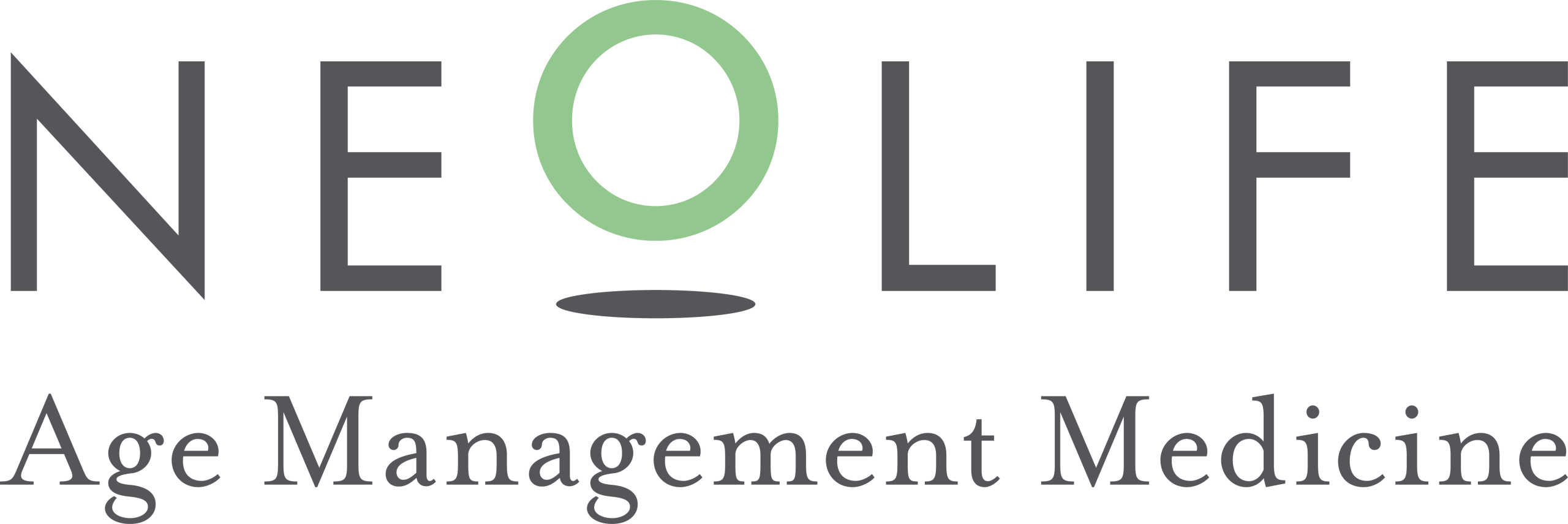The Neolife team wishes, through this article and direct communication with you, to give you all the support, information, and assistance you may need to stay perfectly healthy during this current situation.
In this post, we’ll address various recommendations for dealing with COVID-19: what you can do to protect yourself from the coronavirus, who is most likely to present serious symptoms, what you should do if you or someone you know has symptoms that are consistent with COVID-19, how self-isolation helps, and finally, Neolife’s recommendations for boosting your immune system.
Neolife Medical Team and Nutrition Department
Coronaviruses (CoVs) are a large family of viruses that can cause a variety of conditions, from the common cold to more serious respiratory diseases (1). They usually affect only animals, although sometimes they can be passed on to humans. The novel SARS-CoV-2 coronavirus is a new type of coronavirus that was first detected in December 2019, which affects humans and causes the COVID-19 illness (2).
Experts have confirmed that the virus is transmitted from person to person, through the tiny drops that are released when someone coughs or sneezes. The most common signs and symptoms are fever, cough, shortness of breath, loss of smell and/or taste, and even diarrhea.
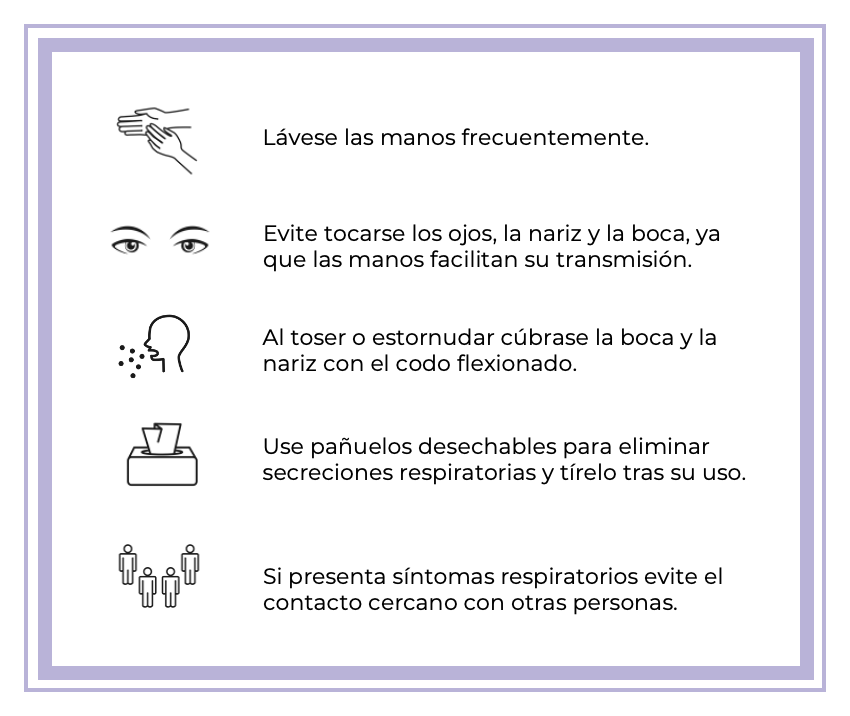
What can I do to protect myself from the coronavirus?
Is the use of masks an effective way to prevent it?
- The general healthy population does NOT need to wear masks.
- Masks help prevent transmission of the virus if worn by those who are sick.
- Healthcare professionals will indicate the use of masks in situations where they deem they are necessary.
Who is most likely to experience serious symptoms?
According to the series published by the Chinese CDC, the highest mortality rate is for the age group of adults over 80 at 14.8%. For patients with no comorbidity, the mortality rate was 0.9%, compared to those with comorbidity, who had much higher rates: 10.5% for those with cardiovascular disease, 7.3% for diabetes, 6.3% for chronic respiratory disease, 6.0% for high blood pressure, and 5.6% for cancer. Modelling has estimated a mortality rate of 14% among those hospitalized and in the general population rates of 0.1 to 0.3%.
Therefore, the most at risk groups are the most vulnerable:
- Adults over 60.
- Patients with cardiovascular disease and high blood pressure.
- Patients with diabetes.
- Patients with chronic lung disease.
- Patients with cancer.
- Immunocompromised patients.
- Pregnant women.
What should I do if I have symptoms of COVID-19?
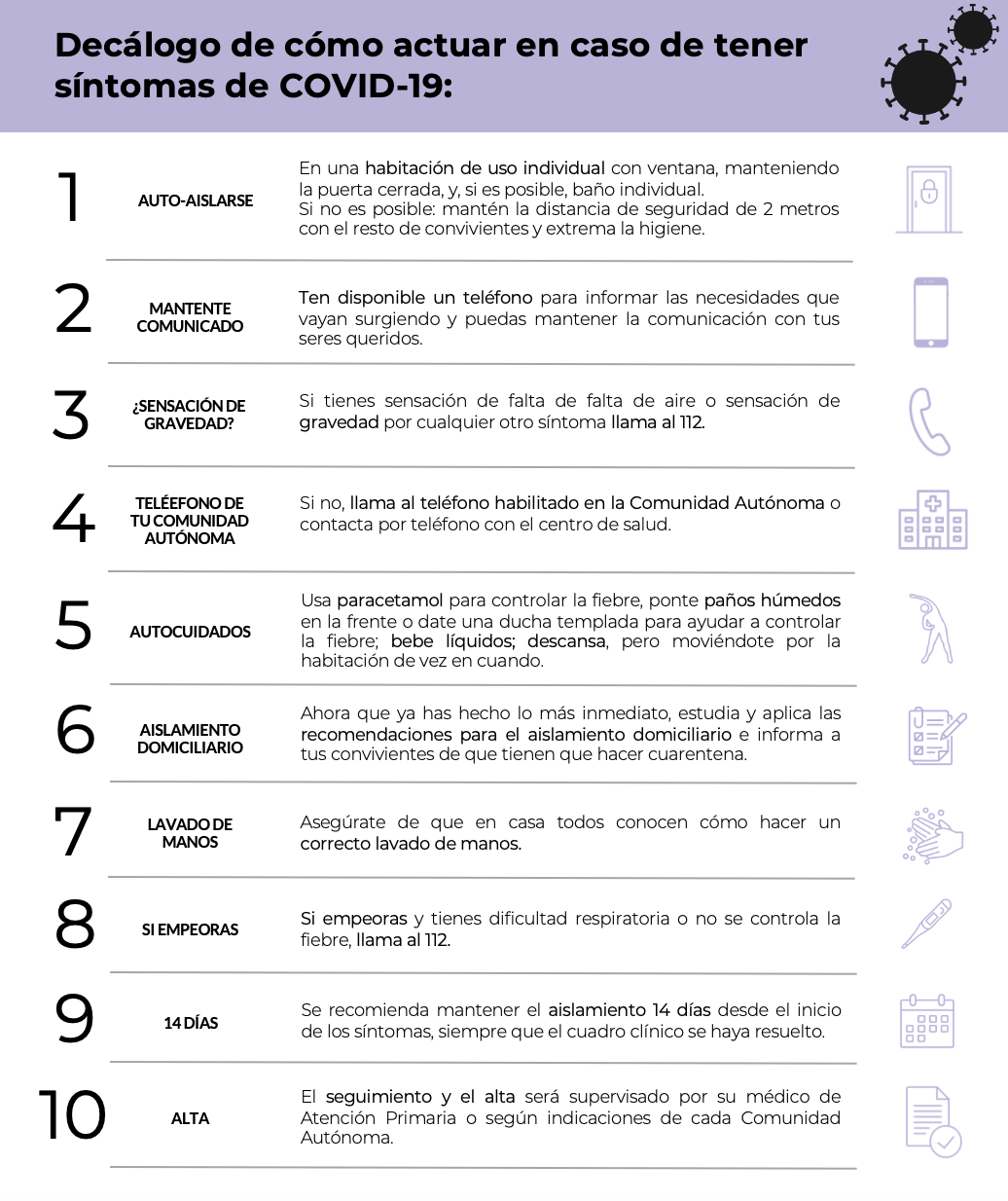
Helplines for each of Spain’s aunonomous communities:
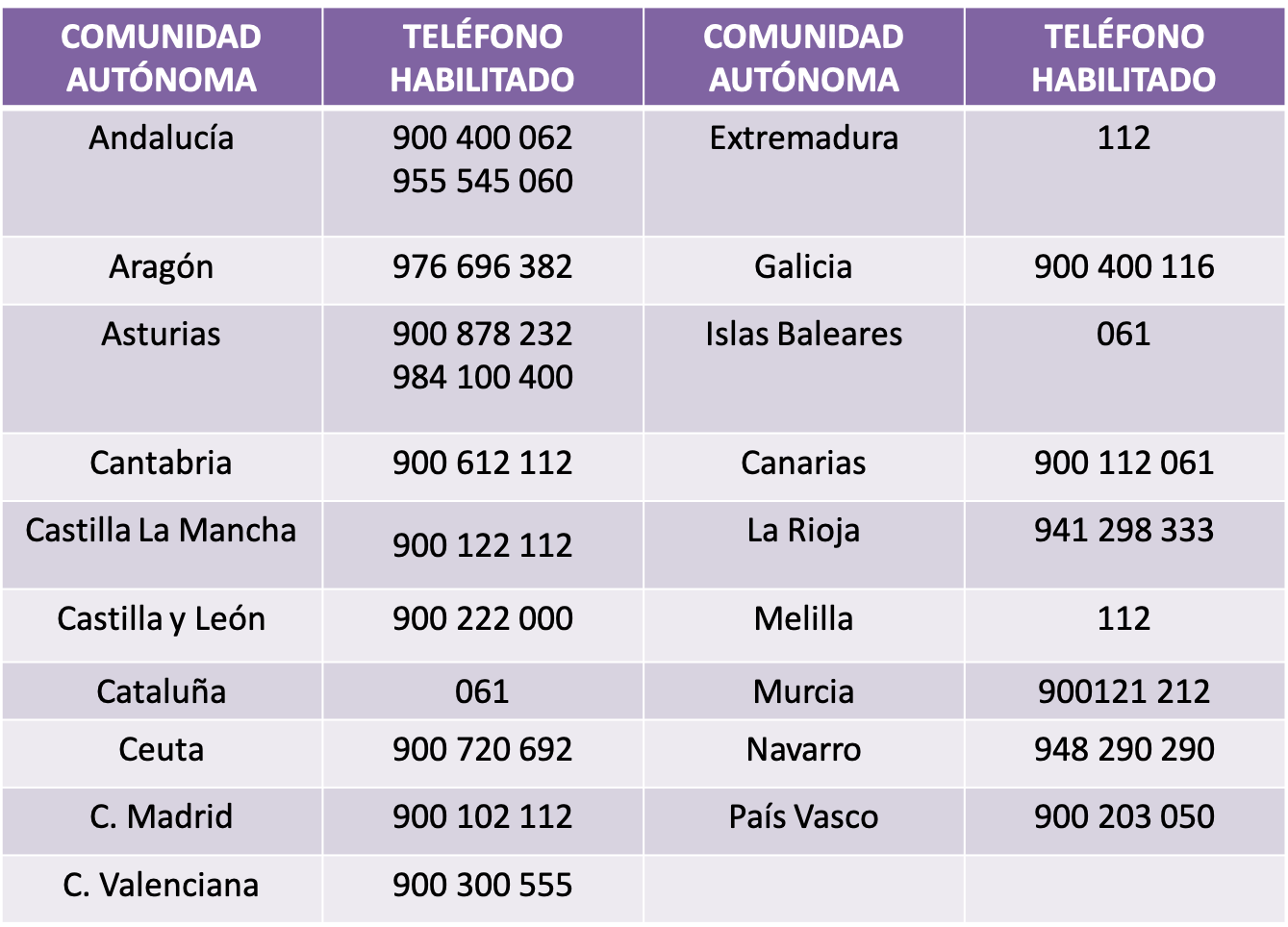
What should I do if I know someone with COVID-19 symptoms? 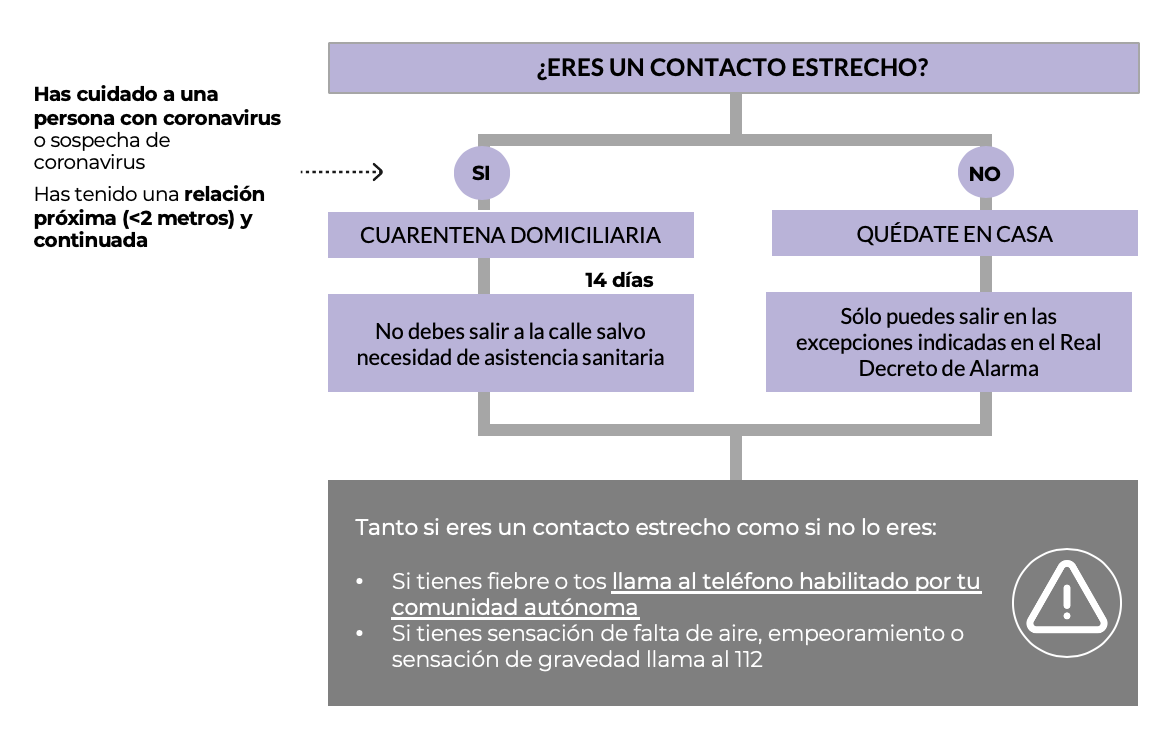 What is self-isolation good for?
What is self-isolation good for?
There’s been a lot of talk about “flattening the curve.” As we discussed in the article about our immune system in relation to COVID-19, none of us have defenses against this new virus, because no one has ever been exposed to it before. Our immune system does not recognize it, but also its capacity for contagion is enormous, which is say to say that PRACTICALLY ALL of us will catch it at some point. The aim of limiting social contact is precisely to prevent everyone from catching it all at once. You’ve probably already heard that, on an individual level, its behavior is not as malignant; over 80% of the infected exhibit mild or moderate symptoms, and 14% develop a serious clinical condition.

We want our health system to be able to take on the number of hospitalizations due to infection and to have enough resources to provide ventilators, medical treatment, etc., to patients who become critically ill.
Recommendations for home self-isolation
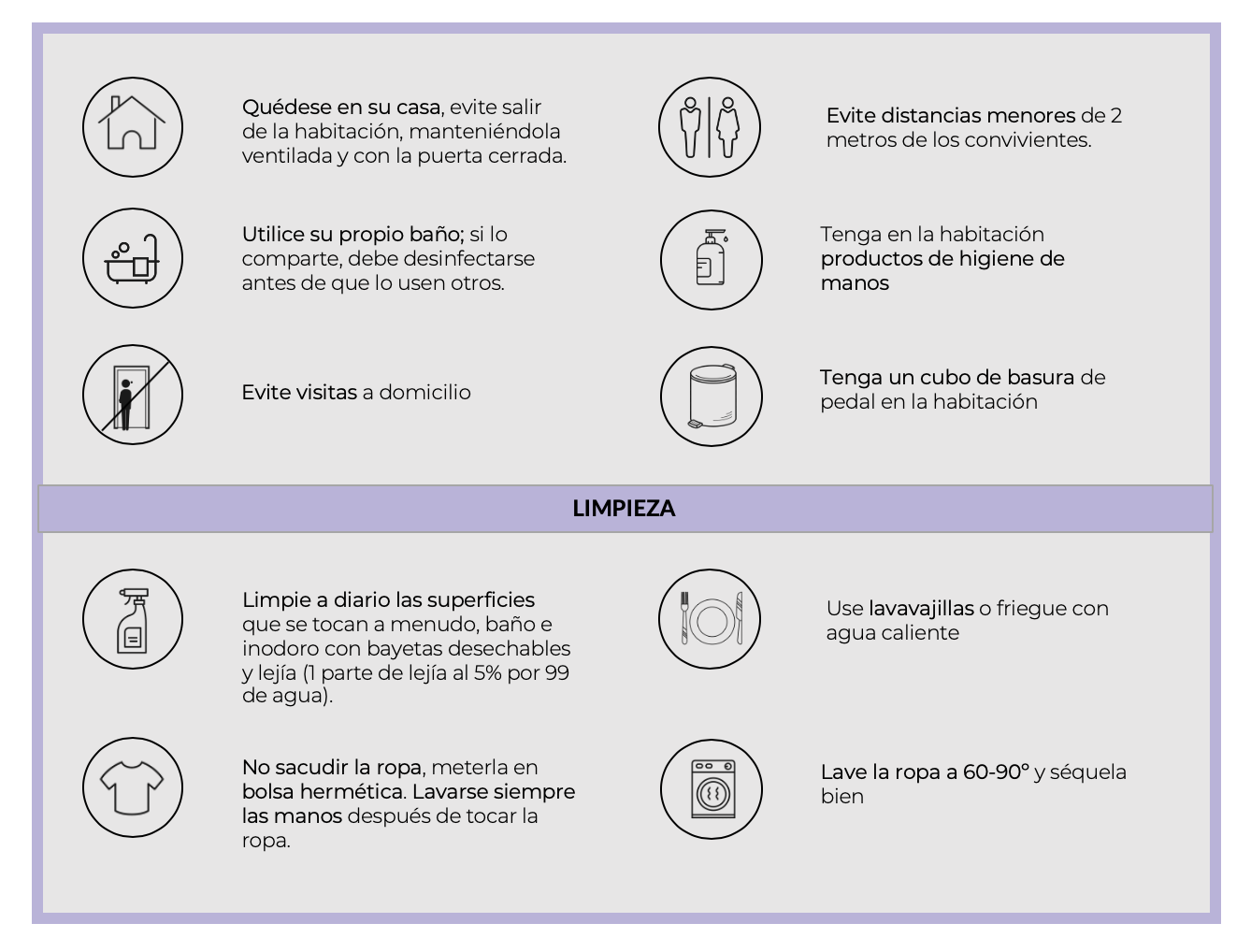
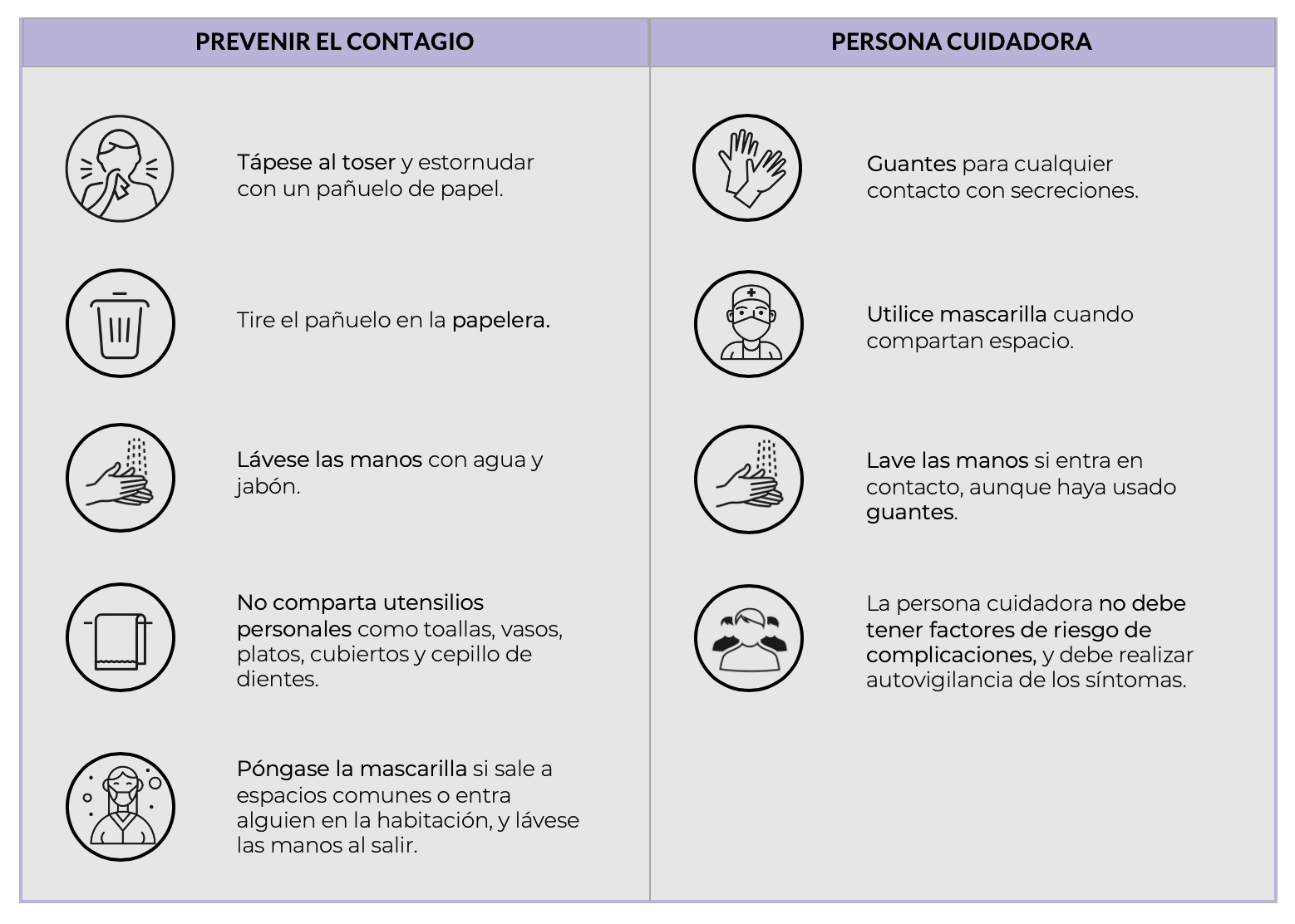 Neolife’s recommendations for boosting your immune system
Neolife’s recommendations for boosting your immune system
As we discussed in this and other articles, having a healthy immune system is critical to overcoming the inevitable COVID-19 infection: both an excessive immune response against the virus and an insufficient one may lead to a serious clinical condition. Available scientific evidence recommends:
1. EATING THE PROPER DIET
Our article titled “COVID-19: How Nutrition Affects Our Immune System” explains how to eat an adequate, balanced, and healthy diet that favors a better immune response.
- It is important to eat a balanced diet, that includes a variety of foods, starting with fresh foods that are rich in vitamins and minerals. Fruits, vegetables, and legumes are foods that contain a high nutritional density and are rich in antioxidants and vitamins, such as C, E, and A, which boost immune response. The Mediterranean diet has shown great health benefits.
- We recommend including bluefish, nuts, extra virgin olive oil, and avocado, to ensure a balanced contribution of different fats that are essential for immune health.
- Regular consumption of fermented dairy such as yogurt or kefir helps increase your immune defenses. Several studies show that those who eat these foods on a regular basis have a healthier immune system thanks to vitamin D. Moreover, probiotics are living microorganisms present in these foods, which have proven to have beneficial actions on the immune system.
- Iron deficiency (common in women and older adults) decreases immune response. Iron is present in the liver, meats, fish, egg yolk and, to a lesser extent, in legumes, so it is wise to include these protein-rich food groups in our diet.
- Vitamin B12 is only present in animal-based food sources, in seafood, meat, fish, eggs, and dairy products. Immune system alterations associated with a deficit in this vitamin have been reported because it decreases antibody production.
- An excessive calorie intake can affect the immune system‘s ability to fight infections, so overweight and obesity are linked to a higher incidence of infectious diseases. Therefore, it is important to control calorie intake during this time of less activity.
2. SUPPLEMENTATION AND ITS BENEFITS TO THE IMMUNE SYSTEM
The blog post titled “COVID-19: The Immune System, Supplements, and Bioidentical Hormone Replacement Therapy” mentions the scientific and medical endorsement of supplements that can help us strengthen our defenses. We’ll summarize it for you here:
- Vitamin and mineral supplements. Vitamins A, D, C, E, B6, B12, and folic acid, as well as the minerals zinc, iron, copper, and selenium play a vital role at every stage of the immune response.
- Natural supplements. Plants such as echinacea, Reishii mushroom, and Shiitake and Maitake mushrooms have immunostimulant and immunomodulatory properties.
- Probiotics. Probiotics promote a healthy immune system and lower the incidence of colds, allergies, and eczema by boosting the immune system. The latest studies show that these beneficial bacteria account for 80-90% of our immune function.
3. HORMONE REPLACEMENT THERAPY. HORMONES THAT STIMULATE THE IMMUNE SYSTEM
You can also find more detailed information about this in the blog post titled “COVID-19: The Immune System, Supplements, and Bioidentical Hormone Replacement Therapy“. We’ll summarize it for you here:
Two of the bioidentical hormones we manage daily with our patients have shown very important effects on the immune system:
- Studies conducted with dehydroepiandrosterone (DHEA) indicate that when given directly or via conversion to other metabolites, it evokes powerful responses from many components of the immune system. It has even been shown to have an adjuvant effect on vaccination, improving the production of protective antibodies.
- Melatonin, on the other hand, is a fascinating molecule with multiple and important functions. It possesses antioxidant properties, regulates cell death, and stimulates the immune system, which supports its use in viral infections that are often associated with injury due to inflammation and increased oxidative stress. Moreover, it has been proven to have a synergistic effect with antiviral drugs. People who take it are advised to increase their doses to 50 mg or even 100 mg to reinforce the endogenous response in this situation.
4. EXERCISE AND REST
Staying active is very important. This situation involves a very significant decrease in our usual activity and our caloric consumption, with the risk of losing muscle mass, increasing body fat, and weakening the immune system. Exercise will take up our time, help improve our mood, maintain our muscle mass and, consequently, also our metabolic rate.
Here at Neolife, we are recommending the use of exercise tables and apps at an individual level that include a series of exercises adapted to the equipment you have access to and your current physical condition.
All our patients have made a great effort so far within their program, and we don’t want them to lose their gains.
On the other hand, you should get enough rest. A good number of hours of restful sleep helps our defense system to stay in top shape.
5. STAY POSITIVE AND AVOID STRESS AS MUCH AS POSSIBLE
Maintaining a positive attitude, managing stress, keeping the mind busy, meditating, practicing mindfulness or yoga are all things that scientific evidence has shown improve our overall health, slow down the aging process, and help the correct functioning of our immune system.
Our recommendation here at Neolife: do some intellectual work, exercise, do pleasurable activities (cooking, reading a book or enjoying your favorite TV series), and keep in touch with family and friends, talking to them whenever you can.
The Neolife team wishes, through this article and direct communication with you, to give you all the support, information, and assistance you may need to stay perfectly healthy during this current situation.
BIBLIOGRAPHY
(1) BVS Spain Regional Portal. (2020). “Enfermedad por coronavirus (COVID-19)” [Coronavirus disease (COVID-19)]. URL: https://bvsalud.org/vitrinas/es/post_vitrines/nuevo_coronavirus/
(2) Government of Spain. (2020). “Enfermedad por nuevo coronavirus, COVID-19: información para la ciudadanía” [Novel coronavirus disease, COVID-19: citizens’ information]. Ministry of Health.
URL: https://www.mscbs.gob.es/profesionales/saludPublica/ccayes/alertasActual/nCov-China/ciudadania.htm (3) (2020). “Brote de enfermedad por coronavirus (COVID-19)” [Coronavirus disease (COVID-19) Pandemic]. URL: https://www.who.int/emergencies/diseases/novel-coronavirus-2019
